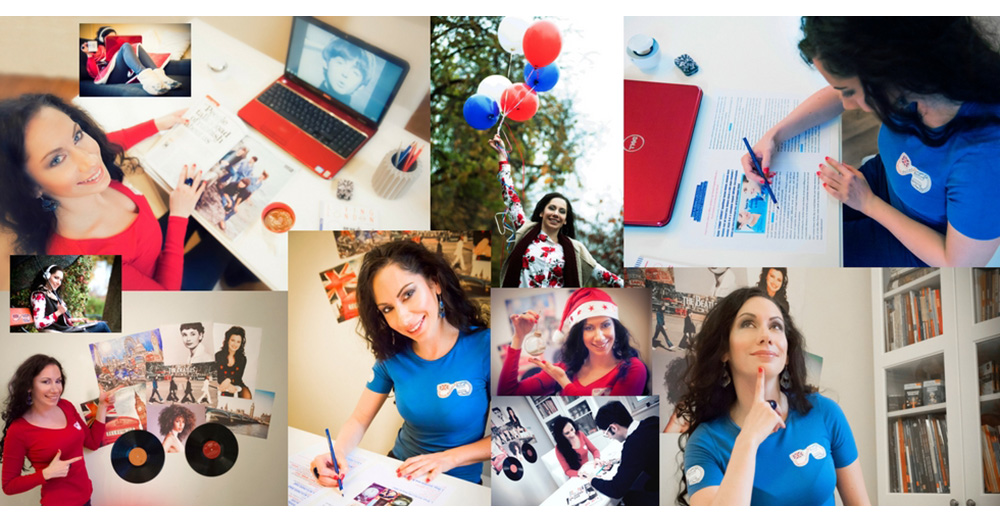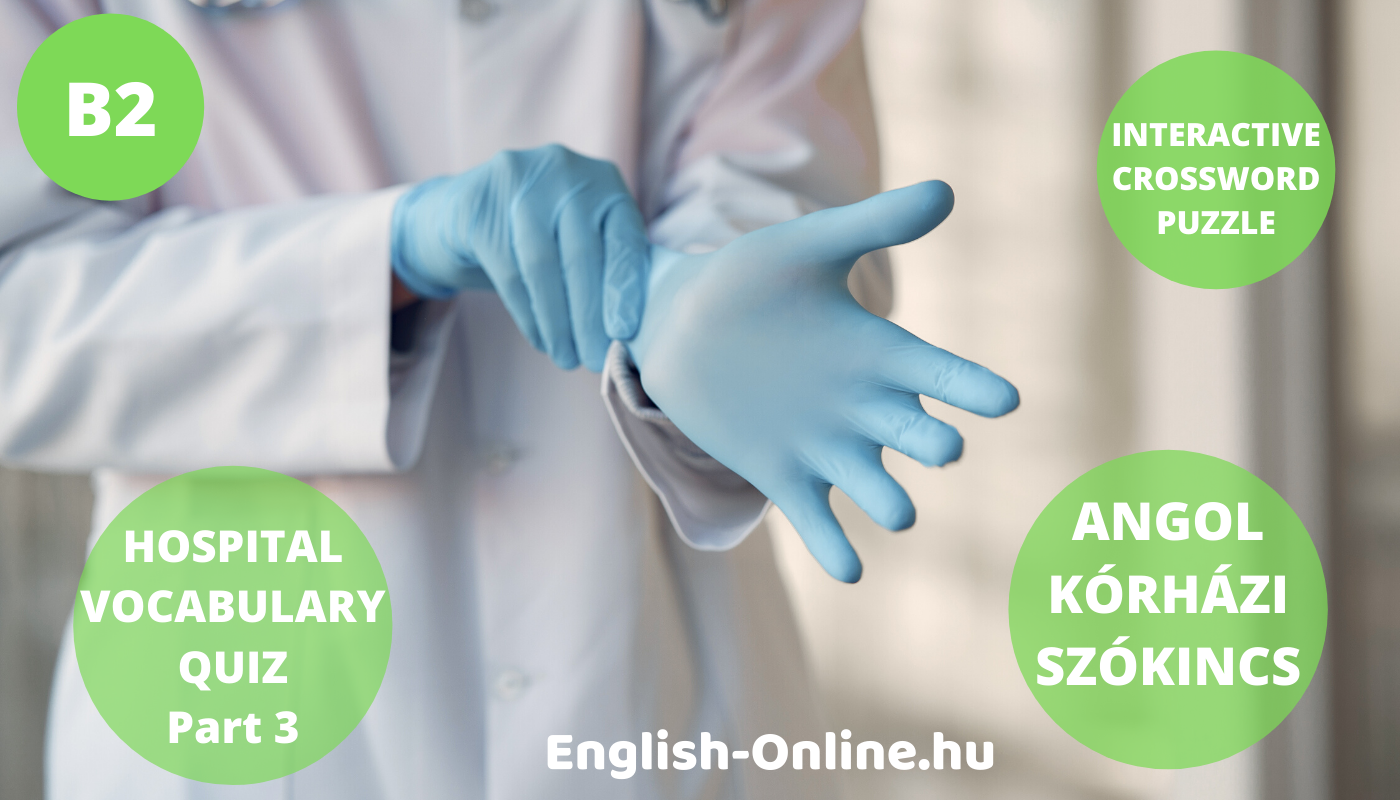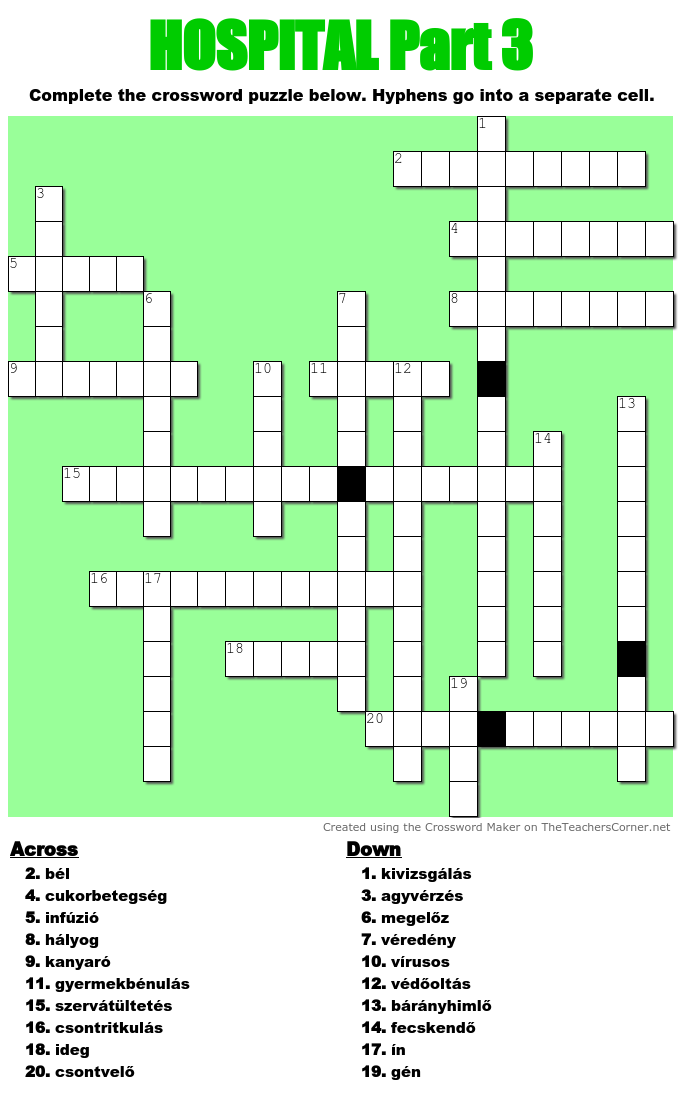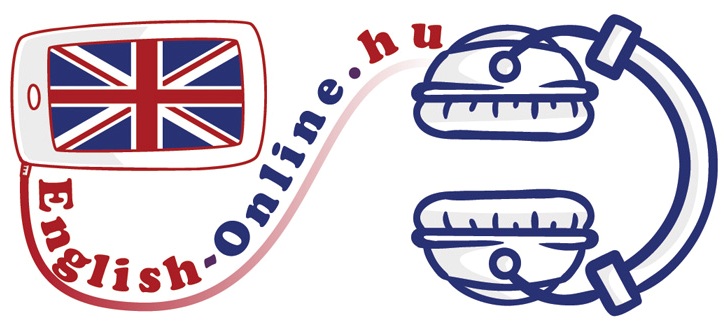Angol tanulás, Angol magánoktatás ONLINE ÉS OFFLINE! Angol Kulturális és Nyelvi Klub
ANGOL VÍRUS SZÓTÁR & keresztrejtvény - segítség az angol nyelvű tájékozódáshoz a koronavírussal kapcsolatban - VOCABULARY FOR VIRUSES
Angol tanulás online és offline, akárhol vagy bárhol! English-Online.hu :) Nyelvtanulás és szórakozás egy helyen!
100+ angol szó a VÍRUSOKHOZ, hogy eligazodj a betegséggel kapcsolatos külföldi hírekben, cikkekben, videókban.
 Az alábbi ANGOL-MAGYAR VÍRUS SZÓTÁR a BBC cikkjein alapul:
Az alábbi ANGOL-MAGYAR VÍRUS SZÓTÁR a BBC cikkjein alapul:
A&E= Accident & Emergency= baleseti & sürgősségi osztály
anti-viral drugs= vírus ellen alkalmazott gyógyszerek
be in intensive care= intenzív osztályon lenni
blood pressure= vérnyomás
break out= kitör
breathing support/life support/respiratory support/mechanical ventilation= lélegeztető gép
cardiovascular= szív- és érrendszeri
case= eset
catch influenza= elkapja az influenzát
chances of dying= elhalálozás esélyei
claim lives= emberi életet követel
cold= megfázás
confirmed cases= megerősített esetek
contagious= ragályos, fertőző
contract a virus= elkap egy vírust
cough= köhög
Covid-19= coronavirus disease 2019= a koronavírus hivatalos elnevezése
curfew= kijárási tilalom
deadly= halálos
death= halál
death rate= elhalálozási arány
develop symptoms= tünetei lesznek, tüneteket mutat
diabetes= cukorbetegség
diagnosis= kórmegállapítás, kórmeghatározás
die= meghal
disease= betegség
disposable tissues= eldobható papírzsebkendő
doctor= orvos
droplet= fertőzést "hordozó" csepp
emergence= megjelenés
epidemic= járvány
estimate= becslés, megbecsülni
fever= láz
fight off= leküzd
flu= influenza
general health= általános egészségi állapot
get better= jobban lesz, felgyógyul
get ready for sg= felkészülni valamire
get the virus= megkapja a vírust
GP= general practitioner= háziorvos, körzeti orvos, családorvos
hand sanitiser= kézfertőtlenítő
hand washing= kézmosás
headache= fejfájás
health care provider= egészségügyi szolgáltató
health condition= egészségi állapot
Health Secretary= Egészségügyminiszter
health system= egészségügyi rendszer
hospital treatment= kórházi kezelés
human trials= embereken végzett kísérletek
hypertension= magas vérnyomás
immune system= immunrendszer
incubation period= lappangási időszak
infect= megfertőz
infected= fertőzött
infection= fertőzés
infectious= fertőző
Érdekelnek az angolos videók?
IRATKOZZ FEL az ANGOL VLOG nyelvoktató csatornámra!
nyelvoktató csatornámra!
mild symptoms= enyhe tünetek
mortality rate= elhalálozási ráta
muscle pain= izomfájdalom
NHS= National Health Service= Országos Egészségügyi Szolgálat (UK)
nurse= ápoló, nővér
organ failure= szervelégtelenség
outbreak= kitörés
pandemic= népjárvány, világjárvány
patients= betegek, páciensek
pneumonia= tüdőgyulladás
prevent= megakadályoz, megelőz
prevention= megelőzés
proportion= arány
protect oneself= megóvja magát
protective clothing= védőruha
quarantine= karantén, karanténba zár
research= kutatás
recover= meggyógyul
recovery= gyógyulás
risk= kockázat, kockáztat
sample of blood= vérminta
sample of faeces= székletminta
sample of mucus= takonyminta
sanitiser gel= kézfertőtlenítő gél
SARS= Severe Acute Respiratory Syndrome= Súlyos Akut Légzőszervi Szindróma
self-isolate= elhatárolódik, bezárkózik
severe= súlyos, kritikus
severity= súlyosság
shortness of breath= légszomj
sleeve= ruha ujja
sneeze= tüsszent
spread= terjed
(doctor’s) surgery= orvosi rendelő
symptom= tünet
take a swab= kenetet vesz
be tested for the virus= vírustesztnek vetik alá
tiredness= fáradtság
transmission= átadás (betegségé)
transmit= átad betegséget, megfertőz
be treated= kezelésben részesül, ápolják
be unaware= nincs tudomása, nincs tudatában
unreported= be nem jelentett
be unwell= rosszul van, nem egészséges
vaccine= oltás, vakcina
virus= vírus
WHO= World Health Organisation= Egészségügyi Világszervezet
KERESZTREJTVÉNY:
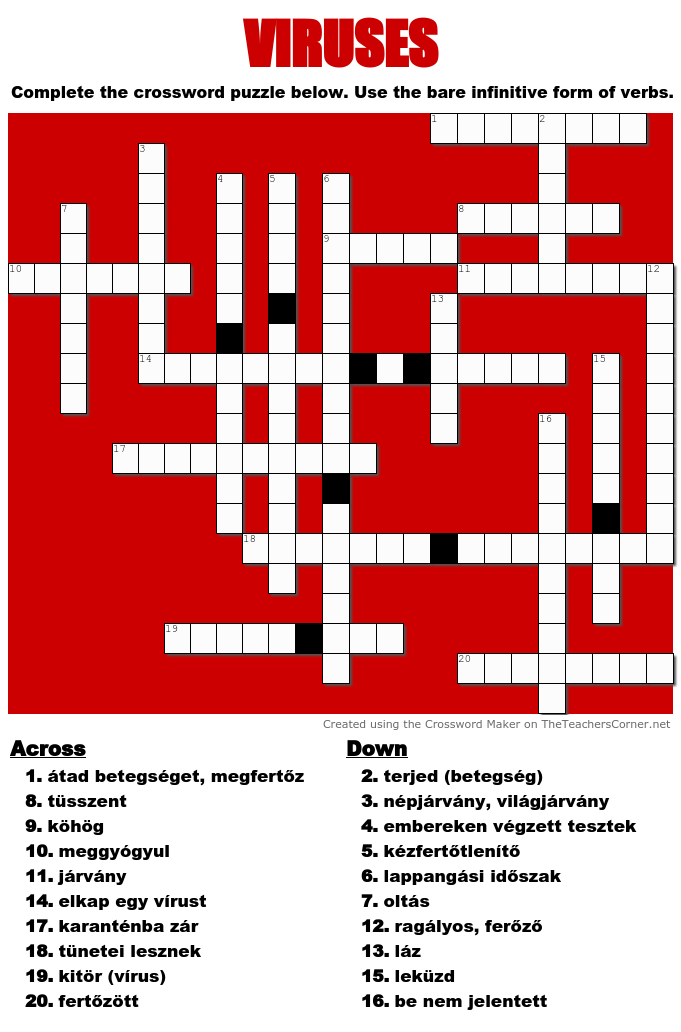
ÉRDEKEL A KERESZTREJTVÉNY MEGOLDÁSA?
IDE KATTINTVA ELÉRHETED :)
Ha tetszett a vírusszótár, támogass egy LIKE-kal ÉS KÖVESD A MEGGYÓGYULTAK SZÁMÁT ITT!
Cheers,
Mel
BETEGSÉGEK, KEZELÉSEK, INTERNET - Illnesses, Treatments & the Internet - Don't Diagnose with a Click! B2 NYELVVIZSGA SZÓKINCSFEJLESZTÉS
Angol tanulás online és offline, akárhol vagy bárhol! English-Online.hu :) Nyelvtanulás és szórakozás egy helyen!
Hajlamos vagy a hipochondriára? Van interneted? Innen már csak egy lépés a netochondria vagy kiberchondria! Olvasd el angolul, milyen veszélyeket rejt magában az, ha megbetegedéseid alkalmával inkább kigooglizod a tüneteidet és orvosi vélemény nélkül öndiagnózisokat állítasz fel. A hasznos olvasmány mellé méghasznosabb feladat társul: helyezd vissza a cikk végén felsorolt egészség/betegség szókincs elemeit (20 db) a szövegbe!
Short on time, or just don't want to bother your GP? It's tempting to turn to the internet to see what might be wrong with you - but that can have negative results...

With GP __________(1) busier than ever, many people are choosing to search the internet for answers to a health worry, or to try to self-diagnose. Evern Health Secretary Jeremy Hunt has suggested parents search online to determine the severity of their children's rash. But, as Dr Ellie Cannon explains, googling __________(2) has its dangers.
THE WHOLE PICTURE
When we make a __________(3), it is about a lot more than your list of symptoms. You'll notice a GP often asks about your job, your relationships or even what you have been eating. You need that whole story to make a proper __________(4) assessment, and Google just can't see that big picture. This often leads to a wrong answer which can be dangerous if a serious diagnosis is missed.
COULD IT BE __________(5)?
Google gives you all the weird and sinister possible diagnoses, as well as the most likely common ones that I see every day in my __________(6). It is human nature to look at those strange possibilities and start to worry you have some very rare, serious illness. Symtom checkers tend to provide vast unrealistic lists of __________(7), most often including the word 'cancer' which, of course, gives people huge amounts of unneccesary worry.
INAPPROPRIATE TREATMENT
As well as worry, googling medical complaints can lead to disappointment. Many websites suggest __________(8) that is not appropriate: US-based sites may recommend pricey experimental treatments that are not available or recommended in the UK. Alternative medicine sites can offer __________(9) that are unproven and come with a heavy price tag. Even genuine medical sites may offer out-of-date advice.
FACE-TO-FACE
It's good to see someone. Whether it's a __________(10) or a GP, there is no substitute for interaction with a real-life healthcare professional. You can't diagnose a __________(11) by trying to match a picture on Google - when doctors __________(12) you they're looking for your general well-being and appearance, and how distressed you are. A quick online check cannot match that universal view.
FEAR THE FAKES
The online world, as we know, can be different to reality, and this is very true for health information, which can be fake or inaccurate. Many sites appear to be written or endorsed by a __________(13) when they aren't - anyone can put a picture of a __________(14) on their blog and fool people into believing it is a genuine medical site. This can be misleading and unsafe.
DO YOUR RESEARCH
But it's not all bad. There are some fabulous __________(15) resources online if you look at the right sites. NHS Choices and NetDoctor offer up-to-date medical information written by UK doctors whose advice you know you can trust. They are good places to read about your diagnosis once you have been to your __________(16) to give you a broader view of your __________(17) and treatment.
ONLINE SUPPORT
If you suffer with a __________(18) or something slightly unusual, an online community can be really valuable. Charities such as the National Eczema Society provide online support and fantastic information, with tips from other sufferers - a great __________(19) of advice and comfort. For rarer __________(20), online communities offer support and information that would not otherwise be readily available.
Adapted from the British Press
Érdekelnek az angolos videók?
IRATKOZZ FEL az ANGOL VLOG nyelvoktató csatornámra!
nyelvoktató csatornámra!
GLOSSARY
CANCER= rák
CHRONIC ILLNESS= krónikus betegség
CLINIC= klinika, szakrendelő
CONDITIONS= állapotok, betegségek, nyavalyák
’CURES’= gyógymódok, kúrák
DIAGNOSIS= kórmegállapítás, diagnózis
DISEASES= betegségek, kórok
DOCTOR= orvos
EXAMINE= megvizsgál
GP= general practitioner= háziorvos, körzeti orvos
HEALTH= egészség
ISSUE= probléma
MEDICAL= orvosi
PHARMACIST= patikus, gyógyszerész
RASH= kiütés
SOURCE= forrás (állításé)
STETHOSCOPE= hallgatócső, sztetoszkóp
SURGERIES= rendelők
SYMPTOMS= tünetek, szimptómák
TREATMENT= kezelés
